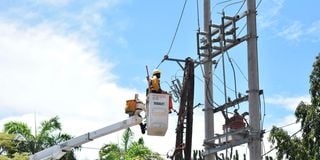Premium
It is a tough balancing act as Kenya starts tapping regional power pool

Kenya Power personnel from the Live Line Team attend to a power issue at Pandya Hospital on November 10, 2022.
Barely two weeks ago, Kenya injected the first dispatch of cheaper hydropower imported from Ethiopia into its national grid, stepping up ambitions of drawing fruits of a regional power pool that presents a tough act of juggling competing interests of consumers, investors, and power producers.
The deal is part of the Ethiopia-Kenya Electricity Highway Project that involves the construction of an electricity highway between the two countries made up of about 1,068 kilometres of a transmission line.
About 631km of a transmission line is in Kenya and will allow for the transmission of up to 2,000 megawatts (MW) of power between Kenya and Ethiopia in either direction. The project is part of the Eastern African Power Pool (EAPP) that aims to interconnect the power grids of 11 countries in the region. The EAPP is one of the regional power pools on the continent including the Southern African Power Pool (SAPP) and the West African Power Pool (WAPP) with the potential for future interconnection.
The EAPP currently has 11 original member countries that signed the Inter-Governmental Memorandum of Understanding (IGMOU) including Burundi, Djibouti, the Democratic Republic of Congo (DRC), Rwanda, Egypt, Ethiopia, Kenya, Sudan, Tanzania, Uganda, and Libya.
South Sudan and Somalia also recently joined the Addis Ababa-based pool that is modelled on Europe, which has a synchronous power grid connecting some 24 countries.
Inter Utility Memorandum of Understanding
Fourteen utilities from the EAPP member countries signed the Inter Utility Memorandum of Understanding (IUMOU).
The Kenya Electricity Transmission Company (Ketraco) this month commenced testing the Kenya – Ethiopia power transmission system with 75MW successfully run through the system in the tests.
The commercial imports of electricity from the Horn of Africa country will commence in December when the power purchase agreement (PPA) signed by the two countries in July takes effect.
The deal will see Kenya purchase 200MW from Ethiopia in the first three years of the 25-year PPA after which the capacity will be stepped up by 400MW.
Kenya is also building an electricity interconnector from Suswa to Namanga that will allow for power interchange with Tanzania once energized.
The line is 95 per cent complete.
However, the construction of a similar line between Kenya and Uganda run into headwinds after the Spanish contractor went bankrupt leading to a protracted legal battle with Kenya.
The electricity imports from Ethiopia will be used as the base load as it is stable helping Kenya reduce reliance on intermittent sources, especially wind power.
Consumer reprieve
If well implemented, regional power pools have the potential to significantly cut costs for consumers.
Kenya retains some of the highest power costs compared to its competitors on the continent, putting a heavy toll on energy bills on households and souring its attractiveness to investors, especially manufacturers.
Poor Kenyan households who consume an average of fewer than 100 units monthly pay Sh19 per unit, a high cost that many cannot afford such that 3 million of Kenya Power’s customers use less than 10 kilowatt-hours (kWh) per month.
Regional power pools also portend potential for energy trades where large power users such as manufacturers can buy electricity directly from another country. This means that a manufacturer in Nairobi can buy cheaper electricity coming from Ethiopia or Uganda.
This is being applied in Europe, where customers can choose an electricity or gas supplier registered in another EU country, provided that the supplier also offers services in their area.
Analysts reckon that cheaper imports could jolt the government to make the local energy sector environment conducive and enable cheaper production of power locally.
“I believe that the government would prefer to rely predominantly on internal capacity, and the very fact of importation is an indication of a deficit in supply,” says Beatrice Nyabira, the partner in charge of projects, energy and restructuring at IKM Advocates.
“The onus is therefore on it to ensure a conducive and predictable environment for IPP projects, and on developers to leverage on technology and other incentives extended to IPPs, so as to ramp up supply at a reasonable price,” she added.
However, numerous pitfalls stand in the way of the effective implementation of a regional power pool.
Key among them are legal and regulatory challenges as the individual member states have different energy frameworks. This raises questions on how contracts between parties within the pool are secured or enforced as well as dispute resolution mechanisms.
“Self-reliance on local sources of power is a matter of national security. Imported power is prone to some obvious risks e.g. political instability – a case in point is the adverse impact that the Russia - Ukraine war has had on the energy supply to Europe. There is also no absolute guarantee that the country that is exporting the power shall continue to have surplus power as its own power needs may change in the medium term.” Ms Nyabira said.
There are also the technical aspects of the structure and ownership of the cross-border transmission links.
Ms Nyabira says there will be a need for rules about shared infrastructure such as cross-country transmission lines with clear delineation of each country’s role in maintenance, upgrading and operations.
“There may be a need to harmonize some of the laws and interstate electricity sale contracts so as to ease the process of importation and exportation of power. Issues around dispute resolution and choice of law should also be carefully considered as they can be particularly complex when dealing with cross-border matters,” she said.
Some analysts say cheaper electricity imports that replace domestic power producers could however negatively affect future investment in the country’s energy sector. This is because potential investors would be of the view that cheaper imports could make their prices uncompetitive and therefore harder for them to recoup their investment.





